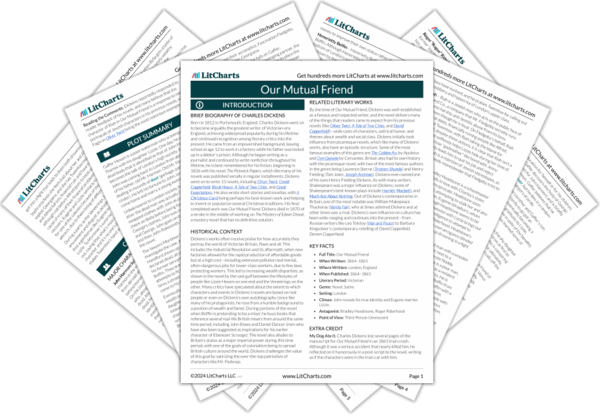Jenny Wren makes dresses for dolls, and the dolls symbolize the dehumanization and manipulation that most wealthy characters engage in. The characters who metaphorically “play with dolls” tend to be adults who come from a more privileged background than impoverished Jenny. Alfred and Sophronia, for example, attempt to manipulate Georgiana and Fledgeby as if they were dolls, trying to get the two to marry. The scheme only ends when Sophronia recognizes Georgiana as a fellow human and not as simply a doll that she can manipulate to try to get money. Similarly, Bradley Headstone also views people around him as dolls to be manipulated. He turns Charley into a miniature version of himself, and he begins to regard Jenny’s friend Lizzie as a possession he deserves to own, rather than as a full human being.
Headstone’s obsession and possessiveness contrasts with Jenny, who instead of treating humans like dolls, treats dolls as if they’re human. Jenny has an active imagination, often picturing fragrant flowers or singing birds when there are none around, and her childlike innocence offers an antidote to the greedy, controlling nature of many adults around her. Dolls in Our Mutual Friend symbolize how in a materialistic, greedy London society, people treat each other like objects to be manipulated, causing adults to appear more childish than actual children like Jenny.
Dolls Quotes in Our Mutual Friend
“Talking of ideas, my Lizzie,” they were sitting side by side as they had sat at first, “I wonder how it happens that when I am work, work, working here, all alone in the summer-time, I smell flowers.”
“As a commonplace individual, I should say,” Eugene suggested languidly—for he was growing weary of the person of the house—“that you smell flowers because you do smell flowers.”
“No I don’t,” said the little creature, resting one arm upon the elbow of her chair, resting her chin upon that hand, and looking vacantly before her; “this is not a flowery neighbourhood. It’s anything but that. And yet as I sit at work, I smell miles of flowers. I smell roses, till I think I see the rose-leaves lying in heaps, bushels, on the floor.[…] I have seen very few flowers indeed, in my life.”

Unlock explanations and citation info for this and every other Our Mutual Friend quote.
Plus so much more...
Get LitCharts A+“But I have heard my birds sing,” cried the little creature, “and I have smelt my flowers. Yes, indeed I have! And both were most beautiful and most Divine!”
“Stay and help to nurse me,” said Eugene, quietly. “I should like you to have the fancy here, before I die.”












